Bengal cats are a popular breed known for their friendly demeanor and wild appearance, featuring a unique spotted coat. Understanding the associated costs is important. While the breed has a significant price tag, many people feel it’s worth it. Knowing the associated costs is important if you’re considering owning a Bengal cat.
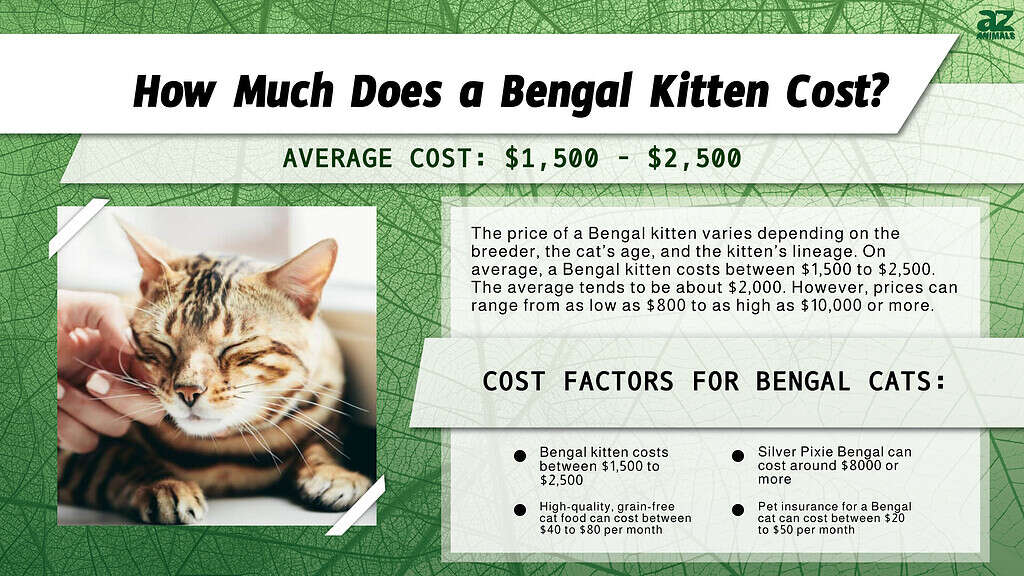
How Much Does a Bengal Kitten Cost?
The cost of purchasing a Bengal cat can differ depending on the breeder you choose. A trustworthy breeder breeds Bengal cats, passionate about enhancing their quality and taking great care of their cats. They may charge more because they invest in breeding programs and genetic testing. However, kitty mills or amateur breeders who only breed cats to make money may charge lesser prices.
The price of a Bengal kitten varies depending on the breeder, the cat’s age, and the kitten’s lineage. On average, a Bengal kitten costs between $1,500 to $2,500. The average tends to be about $2,000. However, prices can range from as low as $800 to as high as $10,000 or more.
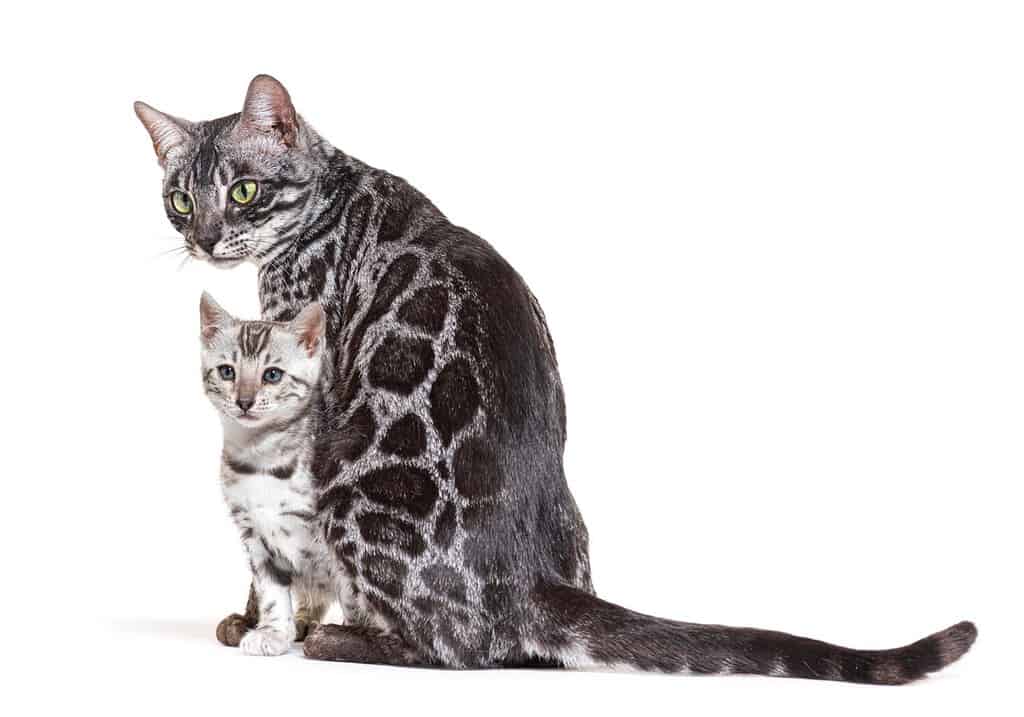
Charcoal Bengals have a dark mask on their face and a cape along their spine.
©Eric Isselee/Shutterstock.com
The price of a Bengal cat can be affected by various factors besides the breeder type. The cat’s lineage is crucial, as kittens with award-winning or champion parents usually have a higher price. Cats from rare bloodlines or special coat patterns can also be more expensive.
The price of a Bengal kitten can be influenced by its location. The price might be higher in places where the breed is uncommon because of high demand. Conversely, the price might be lower in regions where the breed is prevalent.
What Color of Bengal Cat is Most Expensive?
The most expensive color of Bengal cats is the Silver Pixie. The Silver Pixie Bengal has a unique coat pattern that resembles the snow leopard and is highly sought after. A Silver Pixie kitten can cost around $8000 or more, depending on its bloodline and lineage. They are also one of the rarest colors of Bengal Cats and aren’t seen as often compared to other colors.
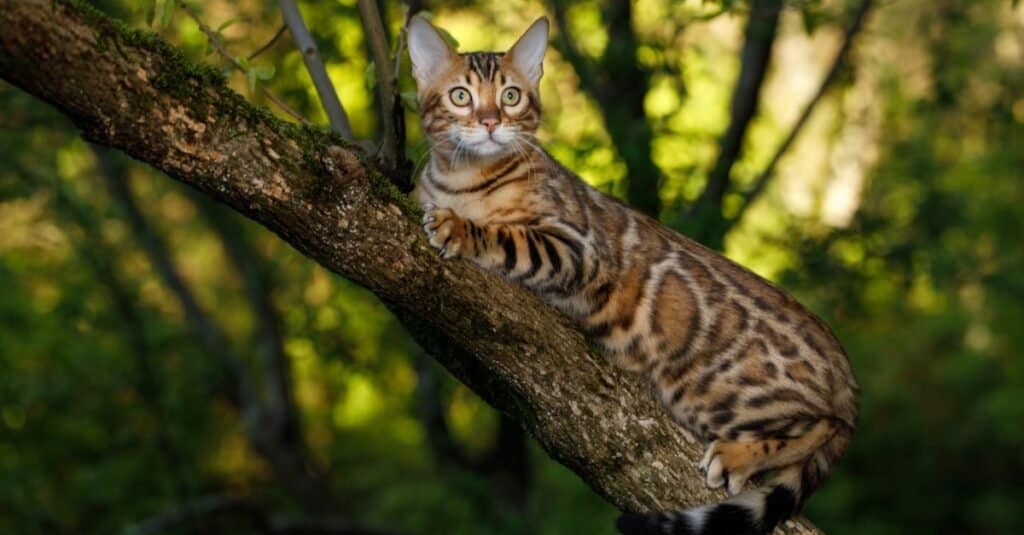
The Bengal is one of the strongest cats that is the most powerful cat in terms of stamina and physical strength.
©Seregraff/Shutterstock.com
Cost of Vaccination and Other Medical Expenses for Bengal
Keeping your Bengal cat healthy is essential by providing regular check-ups and vaccination. The cost of vaccination and other medical expenses for Bengal cats varies depending on where you live and the type of care you provide.
Here’s a breakdown of the typical costs for a Bengal cat’s medical expenses:
| Medical Expense | Cost |
| Basic Check-Up | $50-$100 |
| Vaccinations | $50-$100 |
| Spaying/Neutering | $200-$500 |
| Emergency Visits | $500-$5,000 |
In addition to these costs, you may also need to budget for flea and tick prevention, dental cleanings, and unexpected medical expenses.
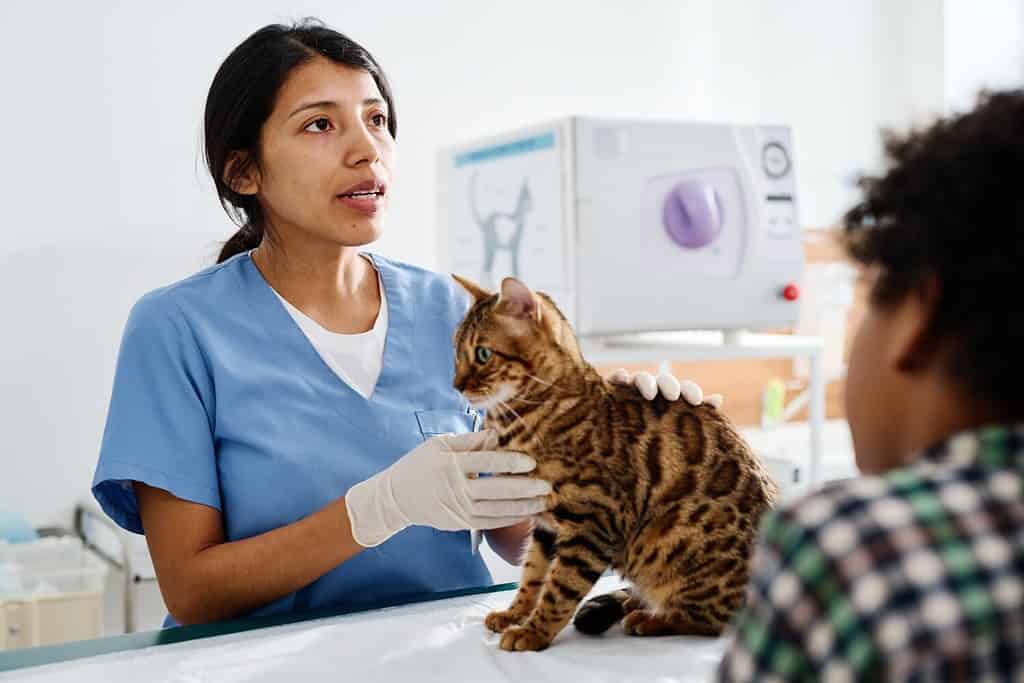
Keeping your Bengal cat healthy is essential by providing regular check-ups and vaccination.
©Pressmaster/Shutterstock.com
Cost of Food and Supplies for Bengal
Another cost to consider when owning a Bengal cat is food and supplies. Bengal cats have a high metabolism and require a high-protein diet. The cost of cat food can vary depending on your chosen food quality. High-quality, grain-free cat food can cost between $40 to $80 per month.
Here are some other supplies expenses to consider:
| Litter | $15-$25 |
| Toys | $10-$25 |
| Scratching Post | $20-$100+ |
| Bedding | $30-$100 |
| Grooming Tools | $20-$50 |
Remember that these costs can add up, especially if purchasing higher-end items. Budgeting for these expenses is essential, and ensuring you can provide your Bengal cat with the necessary supplies and food to keep them healthy and happy.
How Much Does It Cost to Insure a Bengal?
Pet insurance is an excellent way to manage unexpected veterinary bills. Pet insurance costs for these felines vary depending on the provider, coverage, and your cat’s age. On average, pet insurance for a Bengal cat can cost between $20 to $50 per month.
When considering pet insurance, it’s essential to read the policy carefully and ensure it covers your Bengal cat’s specific needs. Look for coverage, including accidents, illnesses, routine care, vaccinations, and check-ups.
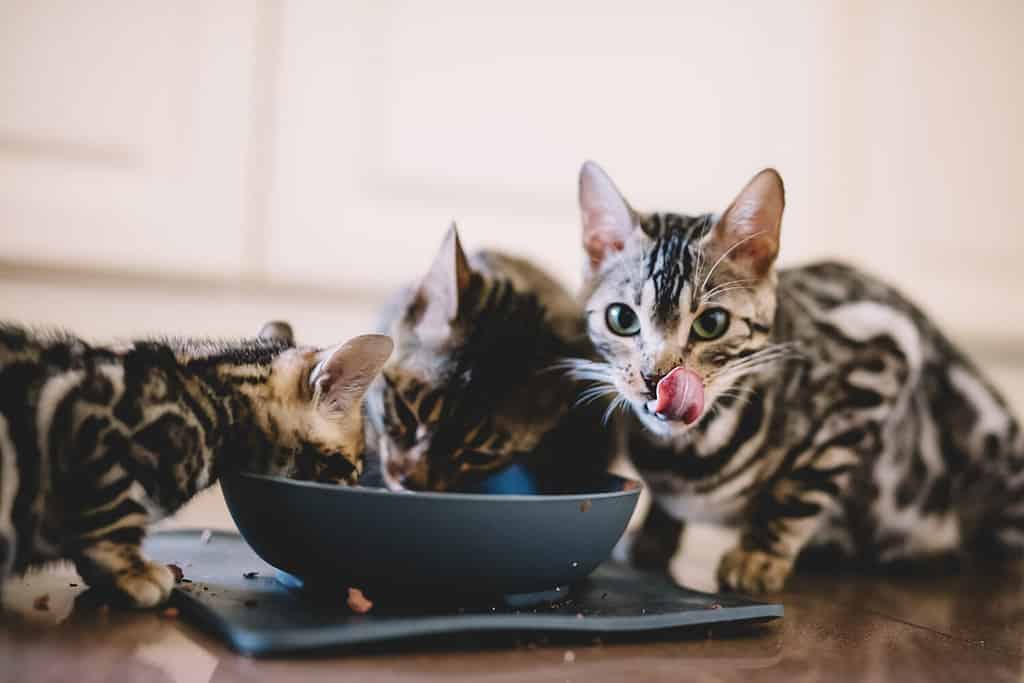
Bengal cats have a high metabolism and require a high-protein diet.
©PHOTOCREO Michal Bednarek/Shutterstock.com
States That Have Restrictions on Owning Bengals
It’s important to note that some states have laws regulating the ownership of Bengal cats. For example, some states require a permit to own a Bengal cat, while others ban ownership entirely. Before purchasing a Bengal cat, check your state’s laws and regulations.
Here’s a list of states with restrictions on owning Bengal cats:
| Georgia | Legal to own Bengal cats, but you must have a permit. |
| Hawaii | Illegal to own Bengal cats within the state. |
| Massachusetts | Legal to own this breed, but you will need a permit. |
| Texas | Legal to own this cat. Some cities, though, have banned ownership. |
| New York | Illegal to own a Bengal cat. |
It’s essential to research your state’s laws and regulations before purchasing a Bengal cat to avoid any legal issues.
Where Can I Find Bengal Cats For Sale?
Bengal cats can be found through breeders, adoption centers, pet stores, and online classifieds. Make sure to research the breeder before purchasing a Bengal cat. Look for reputable breeders that have proper documentation and healthy cats. Ask questions about their experience with Bengals and look at photos of the kittens’ parents to ensure they’re healthy.
Adoption centers are another great place to find Bengal cats. Shelters and rescue groups often have Bengal cats or crossbreeds available for adoption. Adopting an adult cat is a great way to save money, but you’ll have less control over the cat’s medical history and temperament.
What is the Lifespan of a Bengal Cat?
The average life expectancy of a Bengal cat is 12 to 16 years. Bengals are considered an active and healthy breed, so providing them with proper nutrition and regular veterinary care can help keep them healthy throughout their lives.

Shelters and rescue groups often have Bengal cats or crossbreeds available for adoption.
©Lopolo/Shutterstock.com
What Type of Care Do You Need to Provide for a Bengal?
Bengal cats require routine medical care, including vaccinations, parasite prevention, and regular check-ups. They also need a high-protein diet, plenty of exercise and playtime, and mental stimulation to stay healthy. Grooming is important to keep the coat clean and free from mats or tangles. Regular brushing, bathing (every three months), nail trimming, and ear cleaning can help maintain their appearance.
What is the Difference Between a Bengal Cat and a Regular Cat?
Bengal cats are a hybrid breed of domestic and wild Asian Leopard cats. While they look similar to regular cats, they often have larger bodies, bigger eyes, and more distinct markings. They also have higher energy levels and require more mental stimulation than regular house cats. Bengals love water and can be trained to walk on leashes and perform tricks. They are affectionate but are more active than regular cats and may need a larger living enclosure.
Do Bengal Cats Attach to One Person?
Bengal cats are highly intelligent and can form strong relationships with their family. They may prefer one family member but still love all their people. Regular playtime and mental stimulation will help your Bengal cat bond with everyone in your home. You can develop a close relationship with your Bengal cat with patience and understanding.
Conclusion
Before bringing a Bengal cat into your home, ensure you know all the costs involved, such as the initial purchase price, ongoing care, supplies, and pet insurance. Reviewing your state’s laws regarding Bengal cat ownership is important, as there may be restrictions. To keep your Bengal cat healthy and happy, give them all the essential items and nourishment. Your Bengal can make a great companion with proper care and attention for many years.
The photo featured at the top of this post is © EvaGai/Shutterstock.com
Thank you for reading! Have some feedback for us? Contact the AZ Animals editorial team.






